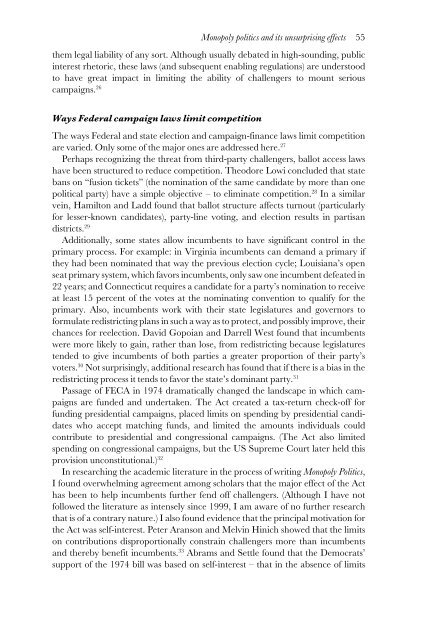Money and Markets: Essays in Honor of Leland B. Yeager
Money and Markets: Essays in Honor of Leland B. Yeager
Money and Markets: Essays in Honor of Leland B. Yeager
You also want an ePaper? Increase the reach of your titles
YUMPU automatically turns print PDFs into web optimized ePapers that Google loves.
Monopoly politics <strong>and</strong> its unsurpris<strong>in</strong>g effects 55them legal liability <strong>of</strong> any sort. Although usually debated <strong>in</strong> high-sound<strong>in</strong>g, public<strong>in</strong>terest rhetoric, these laws (<strong>and</strong> subsequent enabl<strong>in</strong>g regulations) are understoodto have great impact <strong>in</strong> limit<strong>in</strong>g the ability <strong>of</strong> challengers to mount seriouscampaigns. 26Ways Federal campaign laws limit competitionThe ways Federal <strong>and</strong> state election <strong>and</strong> campaign-f<strong>in</strong>ance laws limit competitionare varied. Only some <strong>of</strong> the major ones are addressed here. 27Perhaps recogniz<strong>in</strong>g the threat from third-party challengers, ballot access lawshave been structured to reduce competition. Theodore Lowi concluded that statebans on “fusion tickets” (the nom<strong>in</strong>ation <strong>of</strong> the same c<strong>and</strong>idate by more than onepolitical party) have a simple objective – to elim<strong>in</strong>ate competition. 28 In a similarve<strong>in</strong>, Hamilton <strong>and</strong> Ladd found that ballot structure affects turnout (particularlyfor lesser-known c<strong>and</strong>idates), party-l<strong>in</strong>e vot<strong>in</strong>g, <strong>and</strong> election results <strong>in</strong> partis<strong>and</strong>istricts. 29Additionally, some states allow <strong>in</strong>cumbents to have significant control <strong>in</strong> theprimary process. For example: <strong>in</strong> Virg<strong>in</strong>ia <strong>in</strong>cumbents can dem<strong>and</strong> a primary ifthey had been nom<strong>in</strong>ated that way the previous election cycle; Louisiana’s openseat primary system, which favors <strong>in</strong>cumbents, only saw one <strong>in</strong>cumbent defeated <strong>in</strong>22 years; <strong>and</strong> Connecticut requires a c<strong>and</strong>idate for a party’s nom<strong>in</strong>ation to receiveat least 15 percent <strong>of</strong> the votes at the nom<strong>in</strong>at<strong>in</strong>g convention to qualify for theprimary. Also, <strong>in</strong>cumbents work with their state legislatures <strong>and</strong> governors t<strong>of</strong>ormulate redistrict<strong>in</strong>g plans <strong>in</strong> such a way as to protect, <strong>and</strong> possibly improve, theirchances for reelection. David Gopoian <strong>and</strong> Darrell West found that <strong>in</strong>cumbentswere more likely to ga<strong>in</strong>, rather than lose, from redistrict<strong>in</strong>g because legislaturestended to give <strong>in</strong>cumbents <strong>of</strong> both parties a greater proportion <strong>of</strong> their party’svoters. 30 Not surpris<strong>in</strong>gly, additional research has found that if there is a bias <strong>in</strong> theredistrict<strong>in</strong>g process it tends to favor the state’s dom<strong>in</strong>ant party. 31Passage <strong>of</strong> FECA <strong>in</strong> 1974 dramatically changed the l<strong>and</strong>scape <strong>in</strong> which campaignsare funded <strong>and</strong> undertaken. The Act created a tax-return check-<strong>of</strong>f forfund<strong>in</strong>g presidential campaigns, placed limits on spend<strong>in</strong>g by presidential c<strong>and</strong>idateswho accept match<strong>in</strong>g funds, <strong>and</strong> limited the amounts <strong>in</strong>dividuals couldcontribute to presidential <strong>and</strong> congressional campaigns. (The Act also limitedspend<strong>in</strong>g on congressional campaigns, but the US Supreme Court later held thisprovision unconstitutional.) 32In research<strong>in</strong>g the academic literature <strong>in</strong> the process <strong>of</strong> writ<strong>in</strong>g Monopoly Politics,I found overwhelm<strong>in</strong>g agreement among scholars that the major effect <strong>of</strong> the Acthas been to help <strong>in</strong>cumbents further fend <strong>of</strong>f challengers. (Although I have notfollowed the literature as <strong>in</strong>tensely s<strong>in</strong>ce 1999, I am aware <strong>of</strong> no further researchthat is <strong>of</strong> a contrary nature.) I also found evidence that the pr<strong>in</strong>cipal motivation forthe Act was self-<strong>in</strong>terest. Peter Aranson <strong>and</strong> Melv<strong>in</strong> H<strong>in</strong>ich showed that the limitson contributions disproportionally constra<strong>in</strong> challengers more than <strong>in</strong>cumbents<strong>and</strong> thereby benefit <strong>in</strong>cumbents. 33 Abrams <strong>and</strong> Settle found that the Democrats’support <strong>of</strong> the 1974 bill was based on self-<strong>in</strong>terest – that <strong>in</strong> the absence <strong>of</strong> limits
















